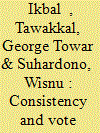| Srl | Item |
| 1 |
ID:
156423


|
|
|
|
|
| Summary/Abstract |
This article examines ambivalence—the simultaneous holding of two or more conflicting values or beliefs about a political issue—among Indonesian citizens’ attitudes about vote buying. Using an original survey taken during the 2014 Indonesian elections, we analyse the factors related both to citizens’ normative views about vote buying and their willingness to accept gifts from candidates. A large number of citizens demonstrate ambivalence by viewing the practice as unjustified or corrupt and yet expressing willingness to accept money from candidates. We also examine the differential effects of education and income on these attitudes. Consistent with “demand side” theories of vote buying, low income creates economic pressure to accept money but does not influence normative attitudes about vote buying. Education, however, has a broader effect by influencing both normative attitudes and willingness to accept money. We consider implications of these results for Indonesian officials focused on reducing vote-buying behavior.
|
|
|
|
|
|
|
|
|
|
|
|
|
|
|
|
| 2 |
ID:
193266


|
|
|
|
|
| Summary/Abstract |
While several studies on the issue have shown that traditional beliefs affect people's political behavior and preferences, very little attention has been paid to how traditional beliefs influence electoral behavior. The only study that has attempted to link traditional beliefs and electoral behavior has done so by analyzing the case of Togo where the party system has been traditionally fairly stable and unfragmented. The case of Indonesia, on the other hand, has undergone significant changes since the end of the Orde Baru, and what was once a fairly unfragmented party system now displays high levels of fragmentation. Hence, it is particularly interesting to explore how the presence/diffusion of traditional beliefs shapes the voters’ choices in a changing, increasingly fragmented, democratizing political system. Moreover, in reviewing the literature on Indonesian elections, we find that, first, the study of electoral behavior in Indonesia has made little effort to employ existing theoretical frameworks; second, quantitative studies are scarce; and third, there are practically no micro-level quantitative studies on electoral behavior. In this article, we assess whether and to what extent the electoral choice of a voter is affected by whether and to what extent they hold on to traditional beliefs by performing statistical analyses of original survey data. We find that voters with a traditional mindset are more likely to vote for the secular parties in the ruling coalition than voters who do not hold traditional beliefs.
|
|
|
|
|
|
|
|
|
|
|
|
|
|
|
|